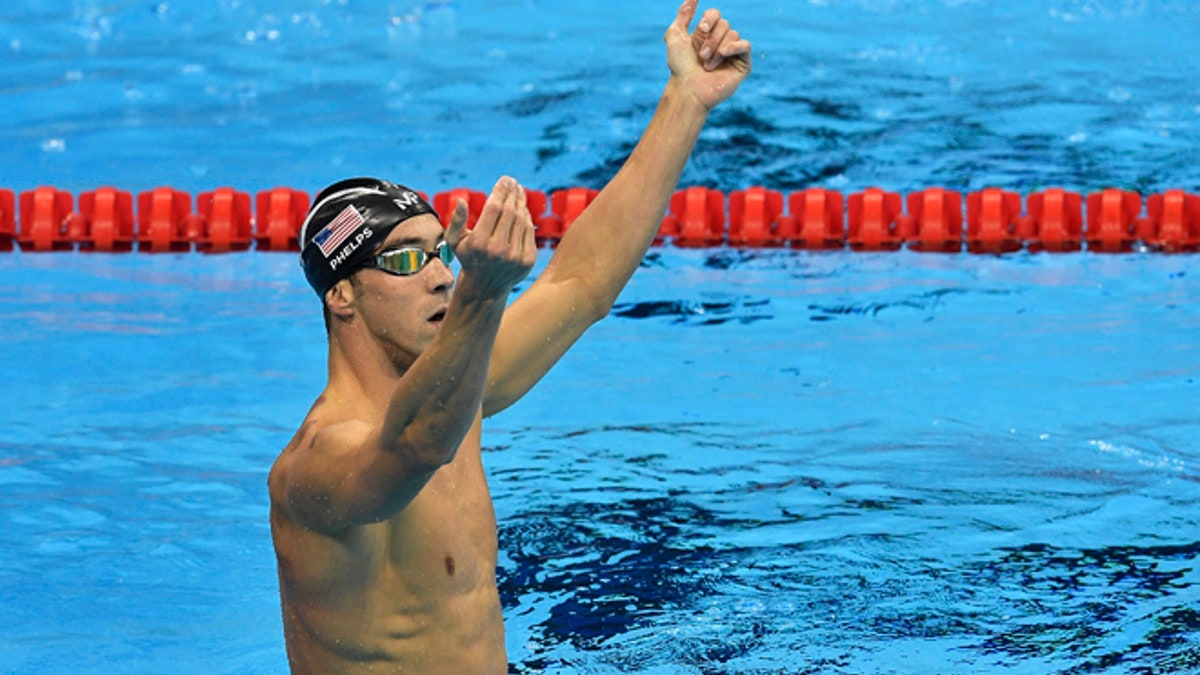
United States' Michael Phelps celebrates after winning the gold medal in the men's 200-meter butterfly final during the swimming competitions at the 2016 Summer Olympics, Tuesday, Aug. 9, 2016, in Rio de Janeiro, Brazil. (AP Photo/Martin Meissner)
RIO DE JANEIRO – This is the one Michael Phelps really wanted, and it showed.
With challengers all around, he simply wouldn't be denied.
After touching the wall first — barely — he held up one finger. Then he sat on a lane rope, egging on the roaring crowd at the Olympic Aquatics Center with both hands, before emphatically pumping his fist in the direction of his fiancee and their infant son.
Once again, the gold medal in the 200-meter butterfly belongs to Phelps.
Being the 20th gold of his career only added to the satisfaction.
Making up for one of the few losses in his staggering career, Phelps held off Japan's Masato Sakai by a mere four-hundredths of a second. The winning time was 1 minute, 53.36 seconds, but that was of little concern. The only thing that mattered was getting to the wall first.
Four years ago, Phelps mistimed his finish in the swooping stroke he does better than anyone, gliding to the wall a little too long after his final stroke. That allowed Chad le Clos of South Africa to stunningly win gold in an event that Phelps had dominated for the better part of a decade.
Phelps retired after the London Games, so it looked like he wouldn't get a chance to make up for his defeat. But when he decided about a year later to start competing again, the 200 fly was clearly the title he wanted more than any other.
Le Clos was in the final again, thoroughly inspired himself by his mother and father, both battling cancer and in the stands cheering him on.
But the South African could only manage fourth this time, finishing behind bronze medalist Tamas Kenderesi of Hungary.
In what was shaping up to be another very good night for the Americans, Katie Ledecky took the most challenging step toward a feat that's only been done one other time.
Ledecky held off Sweden's Sarah Sjostrom to win the 200 freestyle and give the American star her second gold of the Rio Games.
Debbie Meyer is the only female swimmer to capture the three longest freestyle events at a single Olympics, winning the 200, 400 and 800 at Mexico City in 1968. Ledecky looks like a lock to match Meyer, having already won the 200 and 400 titles and an overwhelming favorite in the 800, where she's the world-record holder and far faster than anyone else in the world.
Fifth at the first flip turn, a bit faster than she usually goes out, Ledecky powered to the front on the third lap and grittily shooed off a hard-charging Sjostrom coming to the wall.
Ledecky touched in 1:53.73. The silver went to Sjostrom in 1:54.08, while early leader Emma McKeon faded to the bronze in 1:54.92. World-record holder Federica Pelligrini of Italy was fourth.
"That was a really tough race and it hurt really badly," Ledecky said. "I'm pretty sure it's the closest I've come to throwing up in the middle of a race. I'm just so glad I got my hand on the wall first and it was all worth it."
Ledecky knew this was the most vulnerable of her three individual events. She crushed the world record in the 400 and everyone expects her to do the same in the 800.
The 200 may be the shortest race of the bunch but it's definitely the hardest for Ledecky, requiring her to show both her speed and endurance against a far more competitive field.
"The 200 is a much more stressful race than the 400 and 800, and it always just feels good when it's over," she said. "I took it out pretty fast and kind of forced everybody to try to do that. Once I was ahead I knew I wasn't going to let it out of my hands. I knew I wasn't going to be able to see most of the field on the last 50, so I just had to dig deep."
Phelps hustled off the deck after his victory celebration, having only about an hour to get ready for his second race of the night — anchoring the U.S. in the 4x200 freestyle relay.
Conor Dywer was leading off for the Americans, followed by Townley Haas and 11-time Olympic medalist Ryan Lochte, competing in his first event of these games.
Phelps was picked to finish up, looking to claim gold medal No. 21.




















